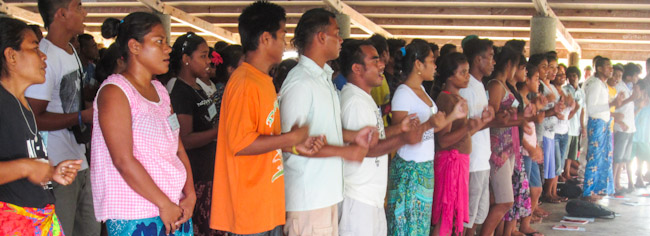The Committee on the Rights of the Child has concluded its consideration of the combined second to fourth periodic report of Kiribati, with Committee Experts congratulating Kiribati for raising the age of marriage to 18, while raising questions about birth registration and school dropout rates for boys.
A Committee Expert congratulated Kiribati for raising the age of marriage to 18.
Another Committee Expert asked about birth registration in Kiribati. Why did so many children in Kiribati not have a birth certificate? What was being done to allow children who were born outside of hospitals to have full access to birth registration? What measures were being taken to promote birth registration and ensure that all children had birth certificates?
One Committee Expert addressed school dropouts, saying there was a high dropout rate, particularly from boys who left school to work in the agriculture sector to earn money for their families. What was being done to address this issue?
Responding to these questions, the delegation acknowledged the shortcomings of the current birth registration system in Kiribati, while maintaining that the State had come a long way. Challenges were faced in terms of geography, and a lack of printing equipment, which meant that birth certificates were sometimes not issued to children in rural communities. Steps had been taken to combat these matters, with five islands having been visited so far by the mobile birth registration programme. This programme targeted those living in marginalised or remote regions, providing them with registration access, and access to birth certificates.
Concerning the high dropout rates for boys, a primary issue was boys’ lower attention span in a classroom setting, the delegation said. Additional factors for dropout included embarrassment, shame, being older than the rest of the class, and appeal for economic opportunities. To combat this, the Ministry was developing courses, including programmes such as business studies, hospitality, plumbing and woodwork, among others, with the goal to increase school retention rates and create pathways to technical and vocational education.
Introducing the report, Tarakabu Tofinga, Minister of Justice of Kiribati, said Kiribati was classified as a least developed country and consisted of 33 small atolls, scattered across more than 3.5 million square kilometres of ocean. In Kiribati’s traditional culture, children did not have a voice in decision making and there were few opportunities for them to air their views. However, there was a growing acceptance for this culture to evolve, to give children a greater voice in the community. The child definition in the Convention had been included in the 2016 Education Act, the 2008 Police Powers and Duties Act, and the 2014 Family Peace Act, the benefits of which included the right to education; protection from early and customary marriage; protection from harmful work; and protection from abuse and domestic violence.
In his concluding remarks, Phillip Jaffe, Committee Vice Chair and Coordinator of the Country Taskforce for Kiribati, thanked the delegation for all the information provided. The Committee looked forward to more interactions with Kiribati in the future.
Daisy Korina, Deputy Secretary, Ministry of Women, Youth, Sports and Social Affairs of Kiribati and head of the delegation, thanked the Chair and Committee Members for the insightful questions and respectful dialogue. The dialogue had been intensive regarding the rights of children in Kiribati. Kiribati looked forward to receiving the Committee’s concluding observations, and gave traditional blessings of peace, health, and prosperity.
Mikiko Otani, Committee Chair, hoped the Committee’s recommendations would assist in the implementation of the Convention and extended her best wishes to children in Kiribati.
The delegation of Kiribati consisted of representatives from the Ministry of Women, Youth, Sports and Social Affairs; the Ministry of Justice; the Ministry of Health and Medical Services; the Ministry of Education; and the Office of the Attorney General.
The Committee will issue its concluding observations on the report of Kiribati at the end of its ninetieth session on 03 June.
SOURCE: UNOHCHR/PACNEWS














